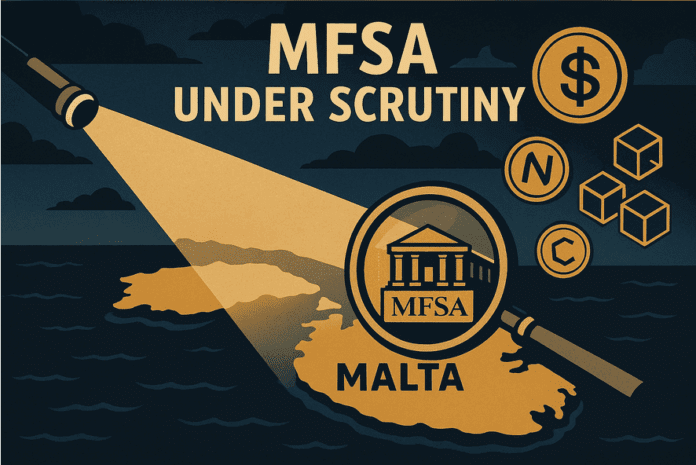Malta’s Financial Services Authority (MFSA) is accelerating MiCA approvals for major crypto exchanges at a pace alarming EU regulators, reviving concerns about the island’s checkered history of lax oversight. With Crypto.com, OKX, and Gemini securing or nearing licenses under questionable timelines, and StablR’s opaque approval, Malta appears to be rebranding its discredited “Blockchain Island” strategy under MiCA’s veneer of legitimacy.
MFSA’s Lightning-Fast Approvals: Speed Over Scrutiny
The MFSA has greenlit OKX and Crypto.com within weeks of MiCA’s June 2025 implementation, with Gemini’s approval imminent This contrasts sharply with slower processes in France and Germany, where regulators emphasize deeper due diligence. The European Securities and Markets Authority (ESMA) is investigating whether Malta’s rapid licensing—four approvals in two months—compromises Anti-Money Laundering (AML) checks.
Critics argue the MFSA is prioritizing quantity, despite claims of a “quality over quantity” approach. Malta’s 2018 Virtual Financial Assets Act attracted 340 applicants but authorized only 11 firms by 2025, suggesting MiCA’s streamlined process is a strategic pivot to salvage its crypto hub ambitions.
StablR: The MFSA’s Most Egregious Blind Spot
The approval of StablR—a stablecoin issuer linked to Payvision’s convicted money laundering network—exposes systemic flaws. Despite CEO Gijs op de Weegh’s direct involvement in Payvision’s $2.1 billion cybercrime facilitation, the MFSA evidently waived MiCA’s Article 60 governance disclosures. This omission mirrors Malta’s 2021 FATF grey-listing for AML enforcement failures, raising questions about regulatory capture.
Blockchain Island 2.0: MiCA as a Trojan Horse
Malta’s 2018 “Blockchain Island” initiative collapsed after 70% of applicants abandoned its costly, bureaucratic regime. MiCA now offers a lifeline: by exploiting the EU’s passporting system, Malta can attract firms seeking rapid access to the bloc while sidestepping rigorous oversight.
Internal MFSA documents obtained by FinCrime Observer reveal a 2024 strategy memo urging “expedited MiCA compliance to reclaim Malta’s leadership in crypto innovation.” This aligns with France’s AMF warning of a “race to the bottom” as smaller jurisdictions undercut stricter states.
Regulatory Fallout: ESMA’s Looming Crackdown
ESMA’s ongoing probe into Malta’s practices could trigger EU-wide sanctions, including license suspensions or centralized oversight. Meanwhile, Germany’s BaFin and France’s AMF are lobbying to strip non-compliant states of licensing authority—a direct challenge to Malta’s strategy.
Conclusion: A High-Stakes Gamble
Malta’s MiCA licensing spree risks repeating the failures of its “Blockchain Island” era, this time with EU-wide consequences. If ESMA confirms lax enforcement, the MFSA’s approvals could unravel, destabilizing firms reliant on its licenses. For RatEx42’s risk ratings, Malta’s trajectory warrants a “Severe Compliance Risk” designation—a cautionary flag for investors navigating Europe’s fractured crypto landscape.
The MFSA’s bet hinges on a precarious assumption: that speed can compensate for scrutiny. History suggests otherwise.




